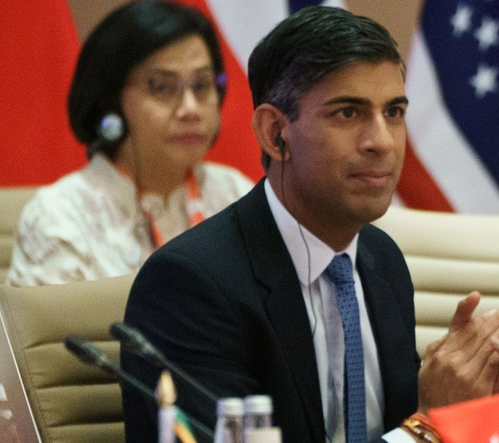London: British Prime Minister Rishi Sunak Monday apologised to the families who lost loved ones in the COVID-19 pandemic as he opened his evidence to an ongoing public inquiry in a tough week, which will also see him tackle a feared revolt over a parliamentary vote on his Rwanda policy to deport illegal migrants.
The British Indian leader said he was “deeply sorry” about the lives lost and stressed that he wanted to give his evidence to the COVID inquiry in the spirit of “constructive candour” so that lessons can be learnt from when he was chancellor of the exchequer 2020-21.
At several points he also defended Boris Johnson’s decision-making pressures as prime minister at the time, saying he met his former boss even more than his wife Akshata Murty during the height of the first COVID lockdown period.
“I just wanted to start by saying how deeply sorry I am to all of those who lost loved ones, family members through the pandemic and also all those who suffered in various ways throughout the pandemic and as a result of the actions that were taken,” said Sunak.
“I’ve thought a lot about this over the past couple of years, it’s important we learn the lessons so we can be better prepared in the future. It is in that spirit, and with the utmost respect for all of those who were affected that I’m here today. I look forward to giving evidence in the spirit of constructive candour to help the inquiry with its deliberations,” he said.
The inquiry barrister, Hugo Keith, then took Sunak through the entire timeline of the COVID pandemic decisions, starting from the first lockdown which was declared in March 2020. He was questioned about some missing WhatsApp messages, to which the UK prime minister claimed they were lost in the process of him changing his phone multiple times in recent years and also that he is not a “prolific” user of the messaging service for government business.
Asked if there was a clash between him as finance minister and scientific advice in favour of lockdown at the time, he responded: “I don’t think I ever refer to it as a clash. I think I saw my role as chancellor of the exchequer as making sure the prime minister had the best possible advice, information, analysis relating to the economic impact and consequences of some of the decisions he was having to make.”
The official inquiry into the government’s handling of the pandemic is being chaired by Baroness Heather Hallett, who has been hearing live telecast evidence in London since June. Last week, Boris Johnson gave his evidence and also opened with an apology to the victims.
Sunak’s day-long evidence comes at the same time as the government’s controversial new Safety of Rwanda Bill is going through its first stages in the House of Commons, where he faces one of his toughest leadership challenges.
The Prime Minister is caught in the middle of two strands within the governing Conservatives, one on the extreme right voiced by sacked home secretary Suella Braverman claiming the bill was not tough enough and the more centrist view of a feared breach of international human rights obligations. Robert Jenrick, who resigned from Cabinet in opposition to the bill, is among a group of MPs who have indicated plans to vote against it. Other Tories are expected to join this feared revolt even as Sunak has defended the bill as the “toughest anti-immigration law ever”.
The bill, expected to face a Commons vote Tuesday, compels UK judges to treat the African nation as a safe country and gives ministers powers to disregard sections of the Human Rights Act.
Under the plan, the UK plans to deport illegal migrants to Rwanda while their asylum claims are processed and hopes it will act as a deterrent for people smugglers bringing migrants illegally to UK shores. The new law is intended to deal with the UK Supreme Court having ruled the policy unlawful earlier this year.
Ahead of the parliamentary vote, Sunak’s official spokesperson said the government will publish a summary of the legal advice it received about the policy in light of the “significant interest” in the advice and the “need to be as clear as possible for the public and parliamentarians”.
PTI
